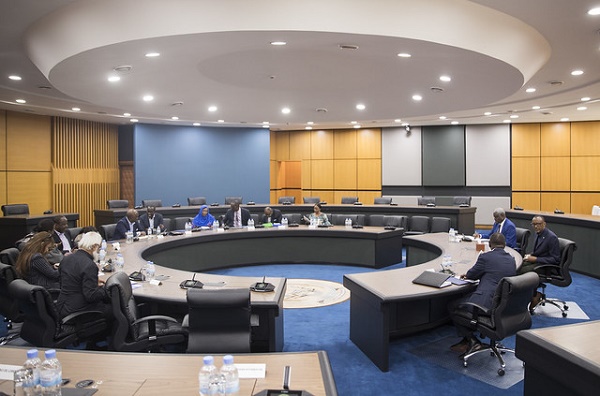
Kigali: President Paul Kagame on Saturday hosted a meeting with the African Union reforms team in Kigali, ahead of the African Union Summit scheduled for July 7-8 in Niamey, Niger.
The African Union Heads of State and Government are set to meet in July which will be the first mid-year coordination meeting of the African Union and the Regional Economic Communities in Niamey, Niger.
The July mid-year coordination meet is a result of a decision adopted by the summit to have an ordinary summit annually as part of the ongoing African Union reforms.
At the Kigali meeting, President Kagame and his team among other things reviewed the progress of the reforms process which will be presented at the summit.
Kagame, who is spearheading the African Union reform process, in 2016 picked a team of experts from across the continent to facilitate the process. The team includes Dr. Donald Kaberuka, Dr. Carlos Lopes, Strive Masiyiwa, Cristina Duarte, Dr. Acha Leke, Tito Mboweni, Amina J. Mohammed, Mariam Mahamat Nour, Hajer Gueldich and Vera Songwe.
Among the key progress is the significant reduction of the African Union budget by 12 per cent.
By trimming the budget, the AU is aiming at being fit for purpose and drive towards financial self-reliance through the 0.2 per cent levy on eligible imports model. The budget serves to finance the cost of running the Union, its organs specialized technical agencies, its representational offices and agencies across the world.
The reforms teams also observed that contributions by Member States to the AU Peace Fund has increased to approximately US$ 115M and a Board of Trustees is now in place. The Peace Fund is established to finance the AU’s peace and security operations.
The fund covers mediation and preventive diplomacy, institutional capacity as well as peace support operations.
Beginning this year onwards, there will be one Ordinary Summit a year and only three key strategic issues for the Assembly’s attention. The trimming of the agenda to three key issues as was suggested in the reforms proposal presented by President Kagame was to ensure that summits tackle issues exhaustively and efficiently.
Further reforms have been on women and youth quotas for posts across the African Union have been established and are being respected. The target is to have 50 per cent of women and 35 per cent of youth by 2025 to have adequate representation.
At the July summit, the framework setting out the principles for the establishment of an effective division of labour at the level of the AU, Regional Economic Communities, continental organizations and Member States will be presented.
The division of labour, when implemented, will ensure that the AU is not overwhelmed by duties that could be executed effectively by other agencies and reduces chances of duplication of tasks and consequently wastage of resources.
A key highlight of the summit will be the launch of the operational phase of the African Continental Free Trade Area (AfCFTA).
Already, the agreement has received 52 signatories with only three countries (Benin, Nigeria and Eritrea) yet to sign, while 24 have ratified it; the agreement required 22 ratifications to put it to effect.
The AfCFTA operationalization will make the bloc the largest free trade area since the creation of the World Trade Organisation (WTO) in 1995. (End)
